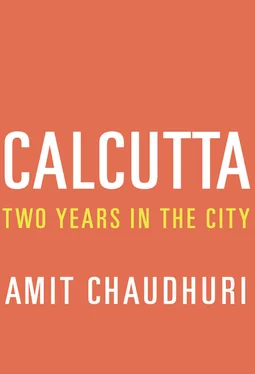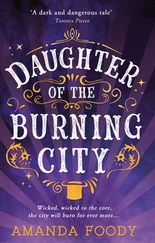I actually like Lakkhi, and I think she likes us. She takes from us little in comparison to what we take from her; but sometimes she also gives. Her gifts are food she’s cooked at home and brought with her when we’re still at breakfast, before temperatures have spiked —taal fritters, brown outside, white within, with a faint sweet aftertaste; the quintessential pithé , cooked in the way my mother abhors, in milk; little trumpet-like flowers from the pumpkin plant that grew from seeds she planted next to her home, which will be deep-fried in a yellow besan batter.
If I’m right, then it’s not the sort of liking that arises from conversation and shared views. But I remember first experiencing this mutual — what is the opposite of antipathy? — affection after she invited us to her older daughter’s wedding in 2004, just after the rains. She’d insisted we must come, and we were intent on going. We saw Subhasgram as in a waking dream — the level-crossing, the railway tracks, the road, the array of built-up houses, the row of bricks that were partly submerged in the undrained monsoon water, and which we negotiated gingerly to reach the porch of Lakkhi’s sister-in-law’s house — which, signalling the auspicious day, had a light raiment of fairy lights. There, I experienced the onrush of Lakkhi’s love, her unexpected hand stroking my arm with a sisterly pressure, her mixture of happiness and sadness when we made our way back, wavering on that line of bricks. She didn’t serve us food that evening, but sat beaming beside us as we ate. It was a small room, with folding chairs and long tables on trestles; and, briefly, during the wedding, our old selves — with their distrust and animosities — died. That strange, transcendental mood lasted till we left Subhasgram.
After Lakkhi took up her job for the third time, there was yet another glitch in her narrative of employment in our household. Her husband, the grocer, developed cancer of the mouth: the outcome of dedicated gutka-chewing. Christopher Hitchens, just a few days dead as I write this, said in an interview that death didn’t scare him, it was a nothing, an annulment, no surprises there, but that “a sordid dying” did. “Cancer can do that to you,” he told Jeremy Paxman sombrely. I think Lakkhi’s husband and most (mainly poor) gutka-addicts I know, who use the narcotic as a pick-me-up in the day, are similarly unafraid, and can’t not know of its corrosive reputation for causing cancer, but toss it mouthward, without a care for tomorrow. But gutka punishes with a “sordid dying,” and this is what happened very quickly to Lakkhi’s husband. She was put on paid leave, but would come anyway to cook for us well after midday. On some days, she’d have to be with him in the government hospital for his treatment. That invariably spelt trouble for us and our lunch. Lakkhi’s husband’s mouth, in the meanwhile, was out of action; he was being drip-fed by a tube inserted in his throat. I asked Lakkhi if he’d had chemotherapy in the hospital; she didn’t think so. She looked a bit vague, exasperated, and out of it. I asked for the doctor’s papers. Having promised me she’d bring them, Lakkhi vanished for ten days. We heard soon after that her husband had died. Then, wounded but mildly relieved, Lakkhi, like one who’s come back from a rough vacation, took up employment again.
* * *
There are times when the kaajer lok situation is in chronic disarray, and there’s no remedy, and Shampar baba —“Shampa’s dad”—must be called. Shampar baba lives in Digha, a seaside resort that’s a holiday destination, but is held in vague disrepute. He runs a “hotel” there; that is, a streetside eatery such as Ramayan Shah’s near Mocambo, serving luchi and vegetables for breakfast and fish or vegetables for lunch and dinner to a constituency of about fifty people a day. He’s not a professional supplier of domestics, but can occasionally think of someone in his neighbourhood who requires a job, and send them promptly in our direction. Or he’ll accompany them himself, usually a diffident girl in her early twenties who’s never worked or seen a city before, but might be lately ditched by her spouse, or unable for whatever reason to get married — the choice is always between the devil, the husband, and employment, the choppy ocean — and on arrival, she must come to an agreement on terms in our drawing room. If the terms don’t work out, they immediately depart, without ostensible hard feelings, to make the journey back to Digha after having obtained the return fares from one of us. If an agreement is reached, Shampar baba will mutter mantralike bits of advice and probably reassurances to the diffident girl as he leaves her on the strange, bookshelf- and photograph-lined, decoration-adorned, furnished terrain of our Sunny Park apartment.
My mother is particularly addicted to Shampar baba; because he has a palliative tone on the telephone, and never forgets to promise even if he can’t deliver. My mother’s never heard him say “No”; at the very worst and least hopeful it’s been “Yes, I know someone, Ma, don’t worry, she’s tied up now but will be free to work in a month.” Who wouldn’t want to talk repeatedly to a man who’s dispensed with the negative? Only last month, in a thankfully short-lived period of flux, my mother said, “I’ve just spoken to Shampar baba, he said it’s all right, he’ll send someone soon.”
R commented reflectively to me, “It’s strange we still speak of Shampar baba when Shampa herself is no longer around.” That’s true — Shampa died this year in May, barely nineteen years old. Shampar baba — whose real name is Nagen — is someone we got to know courtesy of Shampa, who first came to our apartment (I must have been away, because I didn’t see her then) when she was fifteen; there was a vacancy, and someone who works in the building asked her to turn up for the job. R and my mother couldn’t put her to work, realising she was underage; during the day, my mother made her practise reading, which she’d lost touch with since leaving school. She tells me Shampa read from my daughter’s Bengali books in the drawing room, loudly and solemnly. R pricked up her ears when Shampa complained impatiently in the kitchen: “Stupid cough — wonder when it’ll go!” She noticed Shampa got mild recurrent fevers. She and my mother were scared, since our daughter at the time was around ten. R sent Shampa to Dr. Lal, our physician, who suspected tuberculosis. This turned out to be true. After having spent ten days in our house, Shampa went back home with her father, while R began to pay for her medication and treatment. TB, in theory, is treatable today, though there’s a growing number of drug-resistant mutations.
When Shampa came to visit us two years ago, when I saw her for the first time, the tuberculosis had relapsed, though I noticed no sign of it. I saw a fairly small girl with full lips and dark eyes and a wheatish colour, hair parted in the middle and tied at the back, a familiar smile — probably because she’d seen my pictures earlier on a shelf or wall, and heard me mentioned — and no cough, nothing that remotely brought to mind mortality. No cause for anxiety, then; this was the twenty-first century; people who’d got the flu looked far worse off. The first rebuttal of suspicion was, as is often the case, Shampa’s cheerfulness. She was in no mood — and didn’t really seem to have the time — to be terminally ill.
At that point, in fact, she probably wasn’t. And I think she took the prospect of taking on the role of a domestic in the future — there weren’t that many job alternatives for her — robustly, as something that was, for now, being discreetly deferred. Of course, a young girl like Shampa can remain cheery in spite of a possible future of domestic work, because she’s expecting, any day, to get married. Pretty and demure working-class girls like Shampa, blithely less than semi-literate, will get snapped up by bridegrooms, vanish, and then be reincarnated as young mothers raising children. Despite the general misery and constraints of these arrangements, I’d say part of Shampa’s air of happiness came from the status of the girl child in Bengal — where the daughter isn’t, unlike in parts of North India, viewed as a threat to be nipped in the bud. Female foeticide is common in North India, but I sense that rules governing the revealing of the sex of the foetus are followed quite strictly in Calcutta hospitals, whatever other rules are disregarded. And I know many kaajer lok who don’t grudge educating their daughters. Not that girls in Punjab and Haryana, who’ve missed being aborted by a whisker, don’t have an air of natural contentment as they grow up, before becoming wives. But my sense is that, while the birth of a daughter almost everywhere in India is a disappointment, it isn’t, for people like Nagen, an absolute calamity. Does this have something to do with the Left Front government? I know that they attempted actively to educate people in this regard. At any rate, it was impossible to know the exact cause of Shampa’s happiness.
Читать дальше












